Enterprise chatbots have plenty of benefits and use cases. They help businesses reduce customer service costs, automate repetitive tasks, improve lead generation, boost operational efficiency, and elevate user experience. These solutions are used for customer support, inventory management, administrative task automation, and other business functions, enabling enterprise companies to effectively cope with their daily routines.
No wonder more and more organizations are investing in them. Estimated at $7.01 billion today, the global chatbot market is expected to reach $20.81 billion by 2029.
If you don’t want to lag behind the competition, it’s time to tap into the world of enterprise chatbots.
As an experienced chatbot development company, AnyforSoft is here to discuss the capabilities of chatbots for enterprises. You’re about to find out:
- What enterprise chatbots are.
- How they differ from regular chatbots.
- How they can benefit your business.
- Use cases and real-life examples of enterprise bots.
Without further ado, let’s get started!
What are enterprise chatbots?
Enterprise chatbots are AI-powered conversational programs designed specifically for enterprises. They leverage artificial intelligence, machine learning, natural language processing, and natural language understanding to determine the intent behind customer queries and carry on human-like conversations. These tools are used not only for customer interactions, but also for streamlining internal business processes. For example, companies utilize enterprise AI chatbot solutions for employee onboarding, payroll management, order tracking, inventory management, employee support, and other tasks.
To summarize, enterprise chatbots are software programs that streamline both internal and customer-facing activities, helping businesses save time and resources.
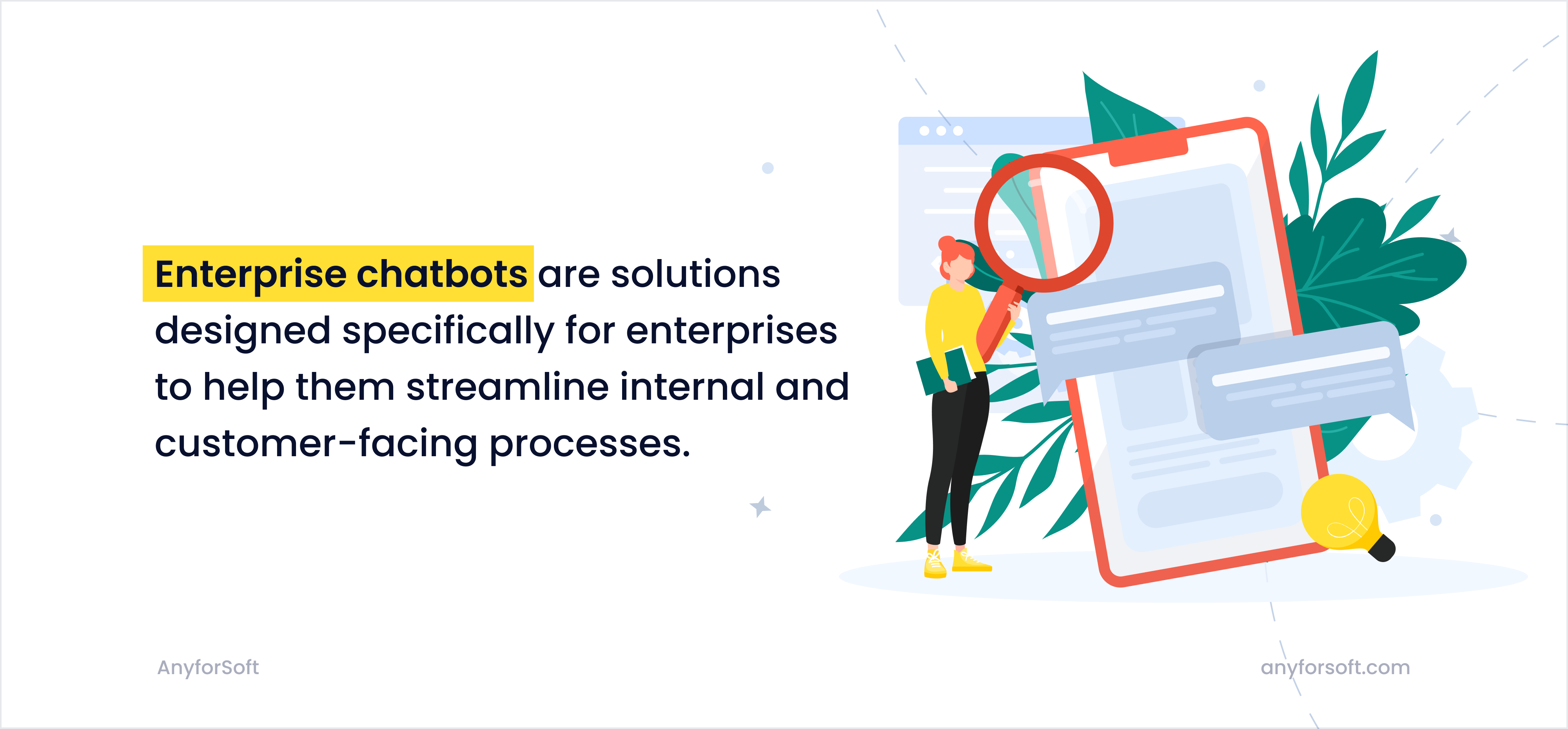
Enterprise chatbot vs regular chatbot: what’s the difference?
Now that we’ve defined an enterprise chatbot, the next question is: How is it different from a regular chatbot? Although the technology behind the two solutions is the same, they are not similar. Take a look at this comparative table to get a better understanding
Benefits of enterprise chatbots
Chatbots for enterprise offer many benefits:
Fast and cost-effective customer support
According to Zendesk, 60% of consumers consider speed the most important aspect of good customer service. Unlike human teams, conversational AI bots reply in seconds, providing valuable assistance at a rapid speed. They also understand multiple languages, allowing you to offer global support for your customers. What’s more, enterprise chatbots work 24/7 so your clients can get help after business hours.
A single chatbot for enterprises can juggle multiple contextual conversations across different geographies, languages, and products. That way, you can resolve more complaints and issues without increasing headcount and service costs.
Enterprise chatbots flawlessly determine the user’s intent behind a query and provide personalized responses. They maintain contexts and pick conversations from where they left off, providing a satisfying user experience. They can also hand off complex cases to human agents while providing them with the entire case history so the user doesn’t have to repeat themselves.
Increased operational efficiency
By streamlining or entirely automating repetitive tasks, enterprise chatbots help you increase operational efficiency. From eCommerce and retail to media and entertainment, businesses of all industries rely on these solutions to minimize redundant work and reduce the burden on human employees.
In our article on chatbot vs conversational AI, we discussed Domino’s Pizza chatbot named Dom. Domino’s Pizza is one of the first enterprise companies to launch a Facebook Messenger bot. It can place orders, track delivery times, redirect customers to a human representative, and even process credit card entries. That way, the tool reduces the workload of the company’s employees while boosting customer satisfaction. It allows Domino’s Pizza to process more orders while enabling clients to buy their favorite food fast and conveniently.
More sales and conversions
Another important benefit of using enterprise chatbots is that they can handle sales and lead generation across multiple touchpoints, helping you increase revenue. By leveraging artificial intelligence and natural language processing, these smart tools recognize a customer’s purchase intent in conversations and can even score their buying potential based on predefined criteria.
A chatbot for enterprise can help your sales and marketing teams with:
- Lead qualification. Conversational AI bots analyze live chats and other messaging channels to recognize the intent of website visitors. Those with buying intent are qualified as likely buyers. Chatbots then pass this info to the concerned team to guide the visitors down the sales funnel.
- Lead capture. Enterprise chatbots capture customer data such as phone numbers and email addresses for further targeting and nurturing.
- Upselling. Apart from answering customer inquiries and questions, chatbots also recommend relevant products, helping you upsell them. They can also notify customers and prospects of discounts and special offers, driving impulse purchases. Pretty good reason to create an AI assistant, right?
Use cases and real-life examples of enterprise chatbots
After discussing the benefits that chatbots bring to enterprise companies, let’s take a look at real use cases and examples of such solutions.
Hospitality
Chatbots elevate the customer experience by providing exceptional support. They offer instant responses, remove communication barriers, reduce customer service costs, and can respond in multiple languages, which is a big advantage for international businesses.
A good example of how a conversational AI chatbot can offer outstanding customer service is Edwardian Hotel’s bot Edward. Edward is a virtual host supporting 9,000+ interactions and 59 languages. The chatbot uses machine learning and natural language processing to understand customer questions and queries, regardless of how they’re phrased. You can ask the AI chatbot if your room is available, book room services (for example, order a meal), schedule events, and much more. Edward serves as a medium between you and the hotel staff—whenever you require something, the staff is notified by Edward and fulfills your needs.
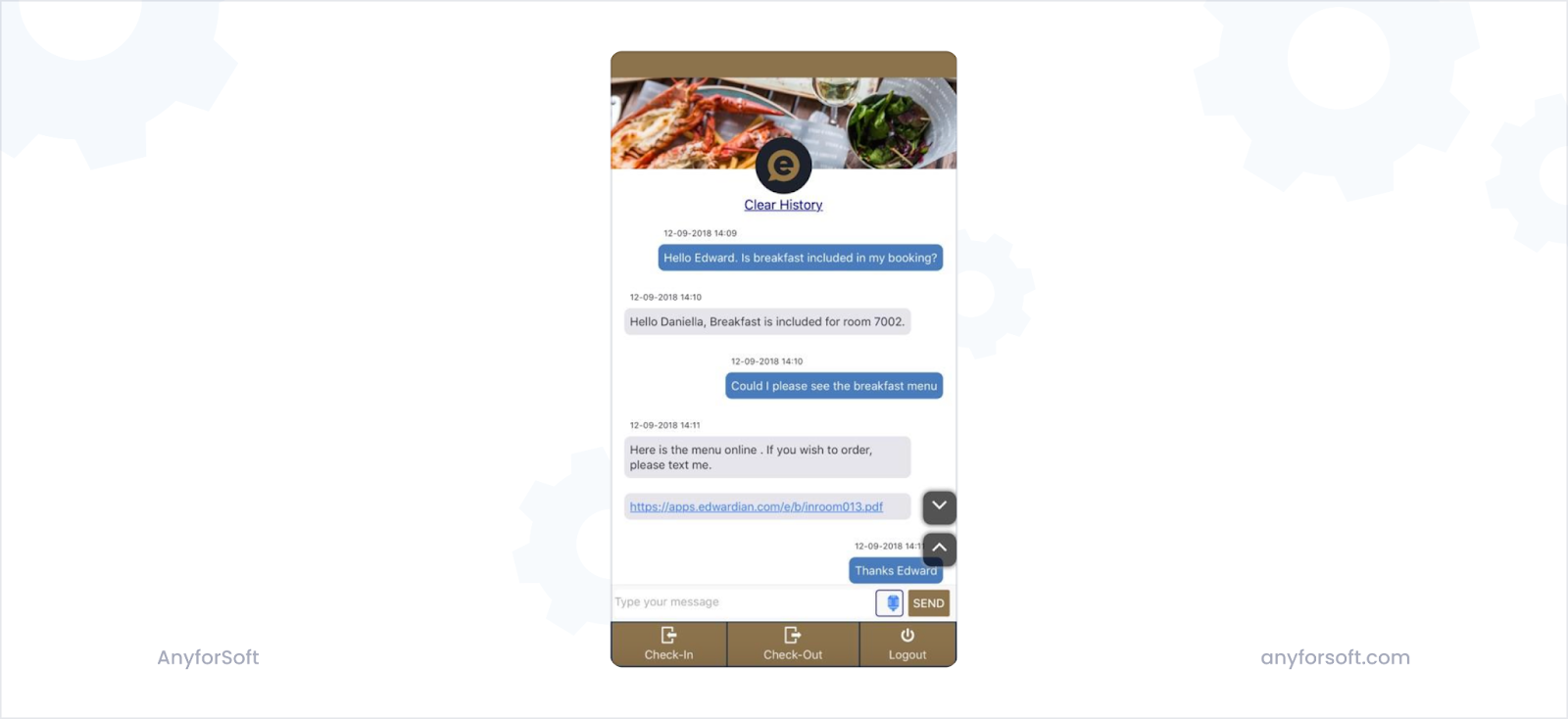
Retail
In the retail industry, enterprise chatbots help businesses increase revenue while improving the customer experience. They recommend products based on user preferences and needs, check item availability, help visitors navigate catalogs, assist with order tracking, inform about sales and discounts, and much more.
A good example of an enterprise bot in retail is Harry Rosen’s chatbot.
Upon entering the store, a user can initiate a chat with Hailey, the company’s virtual assistant. They can ask pretty much anything and expect a meaningful, human-like answer. It provides live updates on order status, cancellations, exchanges, and garment alterations. Now Hailey handles over 70% of customer interactions, having an average accuracy rate of 95%.
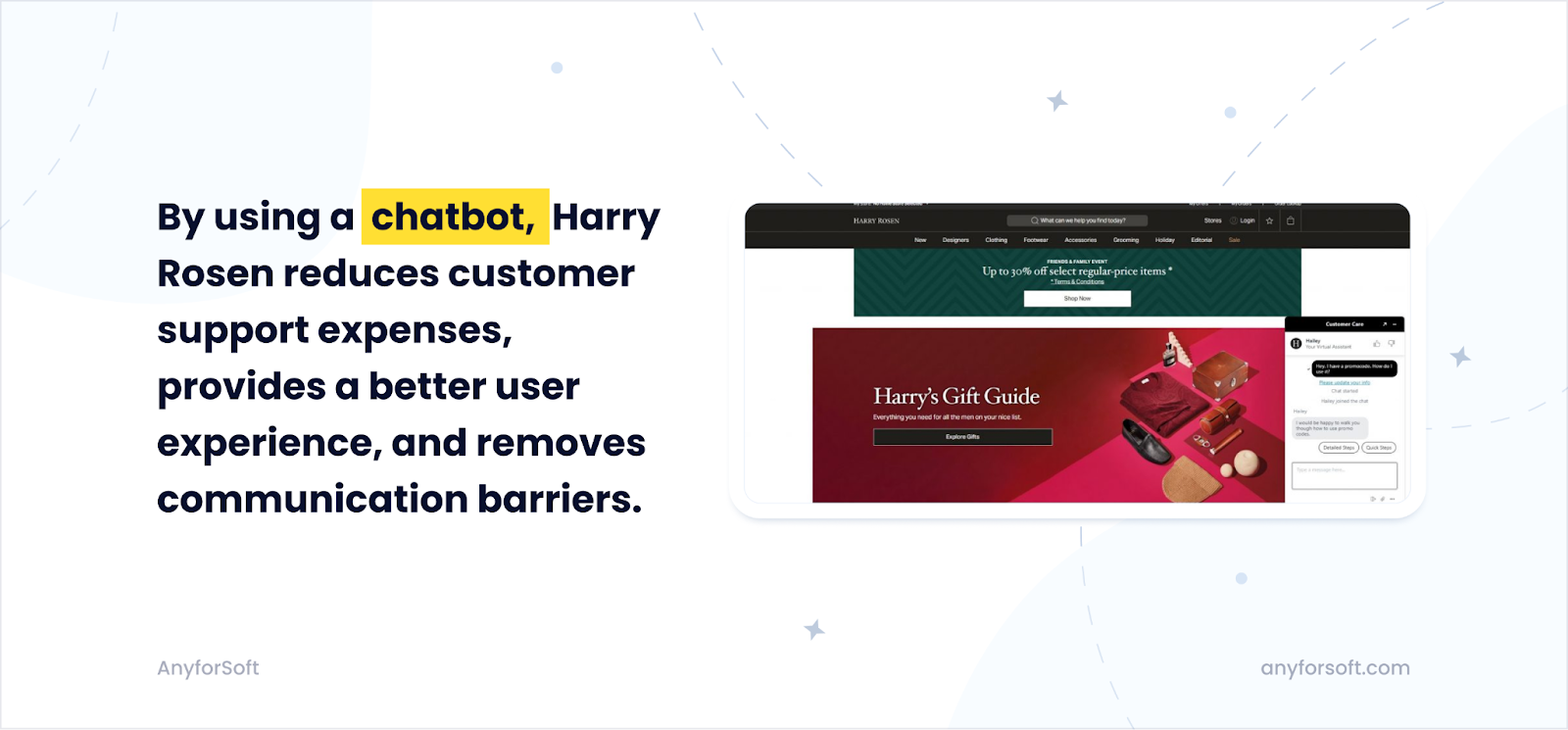
Read also: Custom vs Off-the-Shelf Software: Which is Best for Your Business
Education
In our article on AI chatbots in universities, we discussed in detail how AI-powered conversational bots benefit the educational sector. Let us repeat key points. So these solutions enhance the student experience, simplify enrollment, gather valuable information for data-driven decision making, offer centralized access to information, and, of course, provide valuable support for students. They are used by a myriad of education organizations in and outside the US.
Let’s take Georgia State University as an example. The university uses a chatbot named Pounce. Pounce is a highly intelligent conversational agent with extensive capabilities. It provides 24/7 support, answering questions about admissions requirements, financial aid, campus life, and more through the university website and text messages. The chatbot can also schedule campus tours and connect students with admissions counselors.
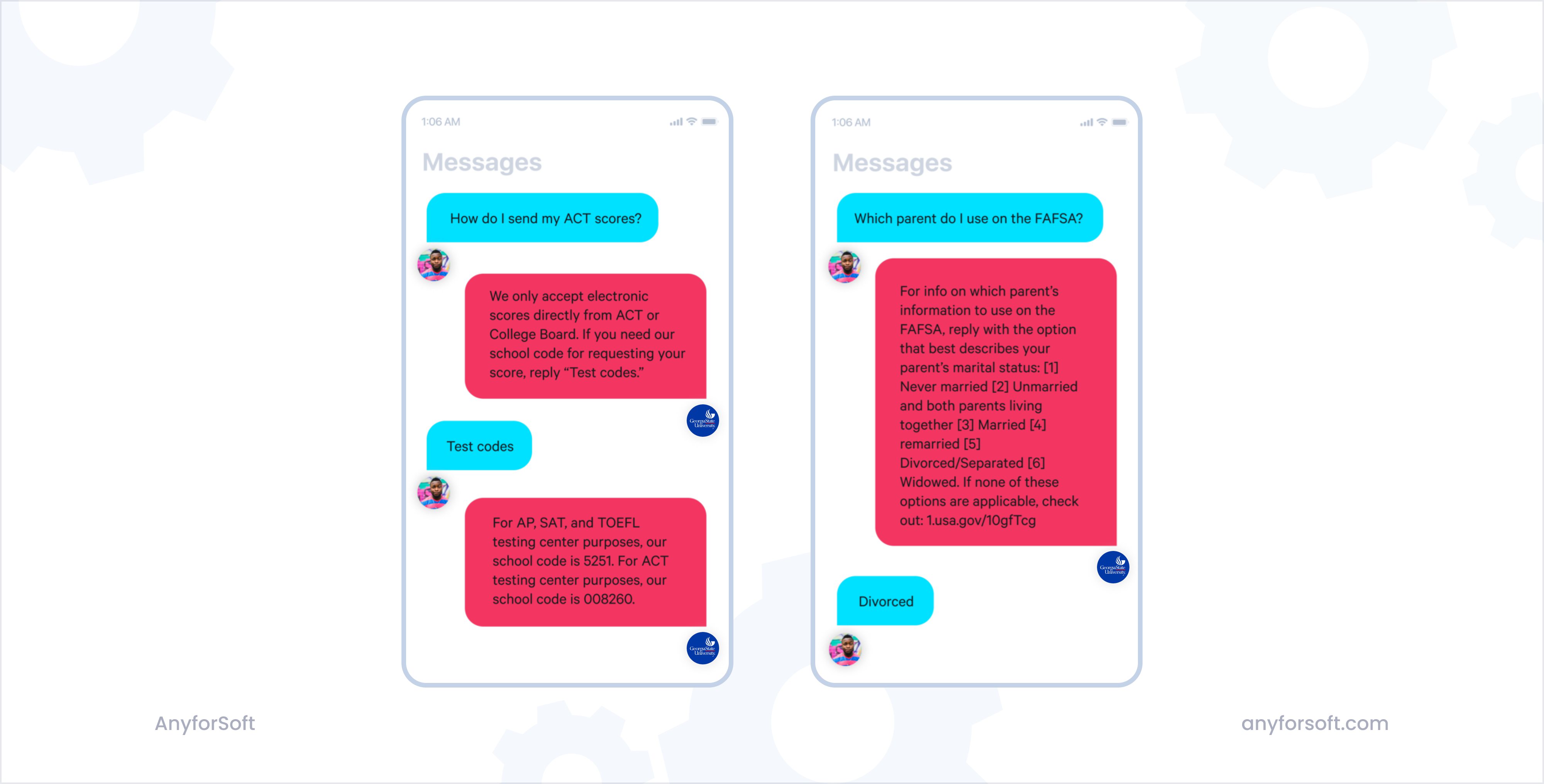
Finance and banking
When it comes to the finance and banking industry, enterprise chatbots provide invaluable help. They assist with money transfers, guide through loan application processes, provide advice on budgeting and saving, monitor transactions, offer investment guidance, and much more. No wonder such solutions are popular among finance organizations and banks.
A good example of enterprise chatbots in banking is Erica, a chatbot from the Bank of America. Erica is a multi-functional tool that provides meaningful answers to your questions (and in case of complex queries, connects you with a human agent). It notifies you of duplicate charges, allows you to view and redeem your rewards, sends bill reminders, offers spending summaries, and enables you to view your balance across all accounts.
Erica handles 2 million customer interactions every day and has surpassed 2 billion as of April 2024. Over 42 million clients of the Bank of America have used this chatbot, benefiting from its wide range of capabilities and personalized insights.
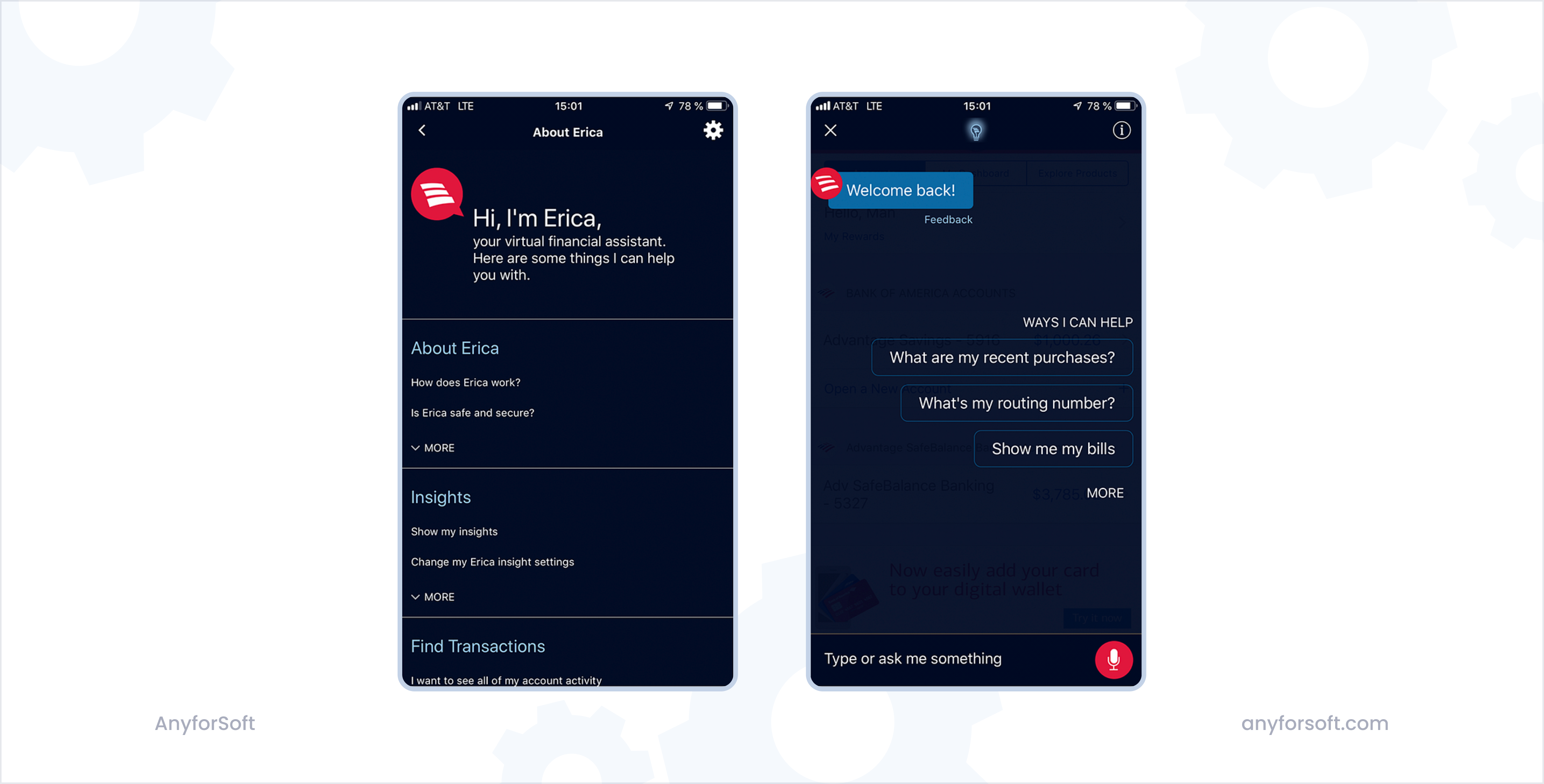
Healthcare
As for the healthcare sector, intelligent chatbots can make a difference between a good and bad customer experience. We all know that the healthcare system is overloaded in many countries, especially the US. You can wait weeks before your appointment, not knowing what’s wrong with you. To alleviate this issue, many organizations implement enterprise chatbots.
Chatbot solutions help patients assess their symptoms and provide preliminary diagnoses. They also manage doctor appointments, remind patients to take their medications, offer mental health support, provide information about diseases, monitor health conditions, and much more. Here are some real-life examples of chatbots in healthcare:
- Ada. Ada is a mobile app that allows users to take good care of themselves. It helps understand, manage, and get care for symptoms with trusted medical expertise in minutes. Having over 13 million users worldwide, the chatbot has provided over 33 million symptom assessments.
- Healthtap. Powered by artificial intelligence and trained by HealthTap doctors, HealthTap AI helps patients evaluate symptoms and provide guidance on the next steps or care. The tool accurately gathers patient information in a human-like conversational experience, summarizes it, and presents it to the doctor. This allows Healthtap’s doctors to be more precise and informed during the visit.
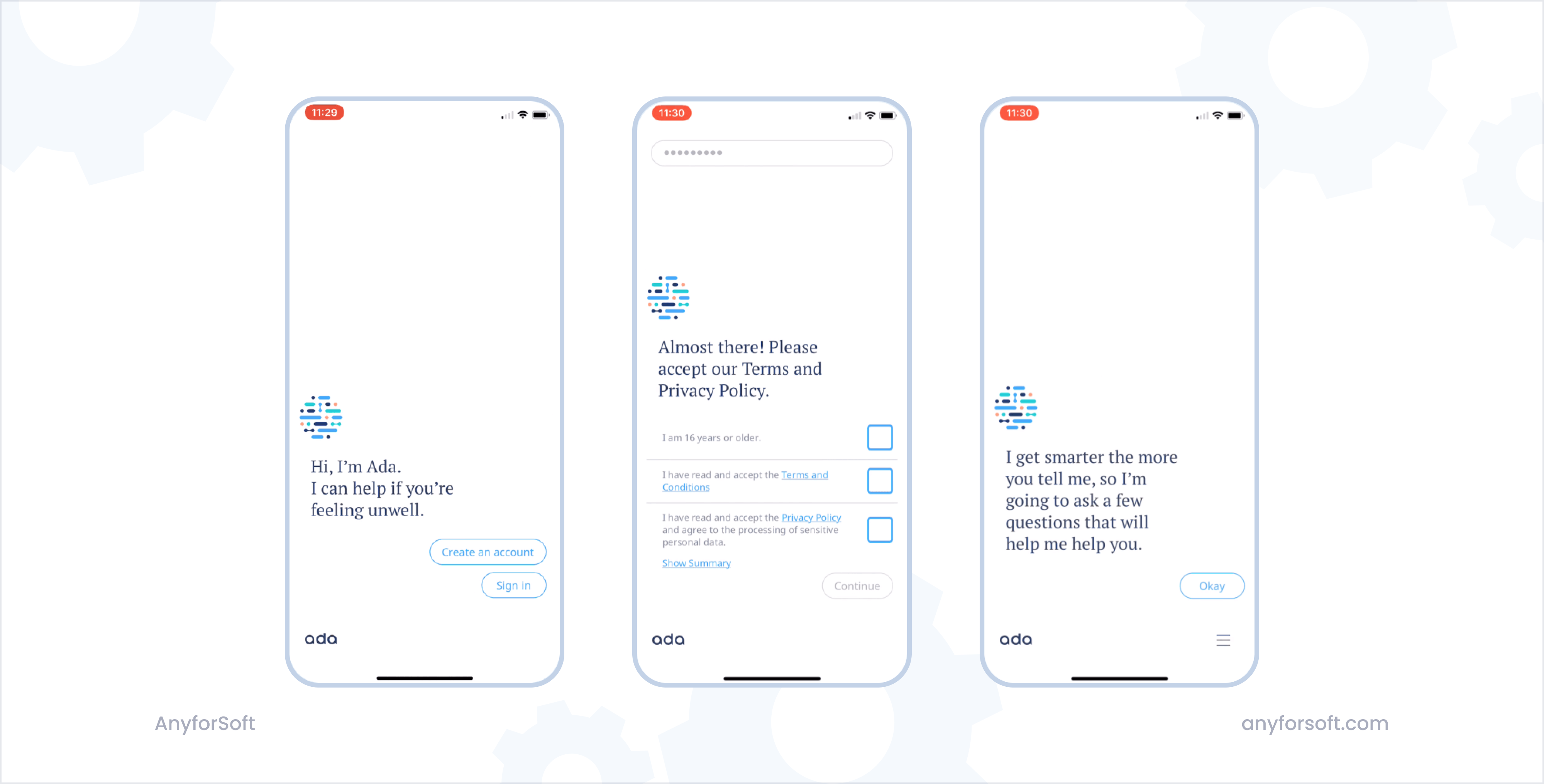
Build enterprise chatbot with AnyforSoft
As you’ve just explored, chatbot solutions are invaluable helpers for enterprises in multiple industries. They elevate customer experience, reduce customer service costs, automate administrative tasks, and help companies boost sales and conversions. Organizations worldwide will continue integrating chatbots, and chatbot technology will soon become the new norm.
If you don’t want to be outperformed by your competitors tomorrow, take action today.
With 12 years of development experience, AnyforSoft will help you build a chatbot of any complexity, from a simple rule-based tool to a sophisticated AI-powered conversational agent. Being a customer-oriented company, we ensure that the end product perfectly aligns with your business needs and requirements while meeting your expectations.
Feel free to reach out to us and tell us about your project.
FAQs
The difference between a regular chatbot and an enterprise AI chatbot lies in the complexity of these solutions. Regular bots are used for simple tasks (answering FAQs, providing basic support, etc.), whereas AI-powered enterprise solutions can handle even the most complex of tasks (disease diagnosis, predicting outcomes, etc.). In addition, AI solutions are more customizable and flexible, can deeply integrate with third-party software, and boast tight data security.
The difference between a regular chatbot and an enterprise AI chatbot lies in the complexity of these solutions. Regular bots are used for simple tasks (answering FAQs, providing basic support, etc.), whereas AI-powered enterprise solutions can handle even the most complex of tasks (disease diagnosis, predicting outcomes, etc.). In addition, AI solutions are more customizable and flexible, can deeply integrate with third-party software, and boast tight data security.
Enterprise chatbots use artificial intelligence and natural language processing to understand the intent behind a user query and provide accurate responses in a human-like conversational manner. They can understand multiple languages and respond to any question, regardless of how it is phrased. Thus, they don’t restrict users’ self-expression, allowing them to communicate naturally and how they see fit.
Enterprise chatbots use artificial intelligence and natural language processing to understand the intent behind a user query and provide accurate responses in a human-like conversational manner. They can understand multiple languages and respond to any question, regardless of how it is phrased. Thus, they don’t restrict users’ self-expression, allowing them to communicate naturally and how they see fit.
The common features of enterprise bots include:
- Natural language processing and natural language understanding.
- Artificial intelligence.
- Deep integration with third-party tools (CRMs, HR systems, ERPs, etc.).
- Omnichannel support.
- Analytics and reporting.
- User-friendly conversational interface.
- Customer feedback collection capabilities.
- Multilingual support.
- The highest level of data security.
- Context awareness and remembering past interactions with users.
- Advanced customization and personalization capabilities.
The most advanced solutions also support multiple communication channels, including voice and video, allowing users to communicate in any convenient way.
The common features of enterprise bots include:
Natural language processing and natural language understanding.
Artificial intelligence.
Deep integration with third-party tools (CRMs, HR systems, ERPs, etc.).
Omnichannel support.
Analytics and reporting.
User-friendly conversational interface.
Customer feedback collection capabilities.
Multilingual support.
The highest level of data security.
Context awareness and remembering past interactions with users.
Advanced customization and personalization capabilities.
The most advanced solutions also support multiple communication channels, including voice and video, allowing users to communicate in any convenient way.
